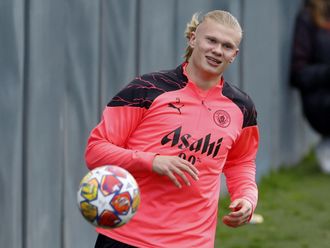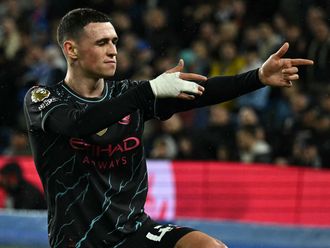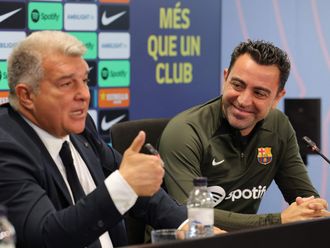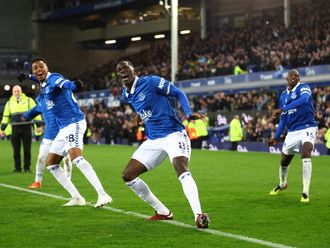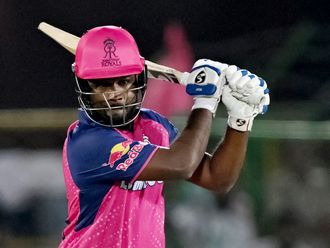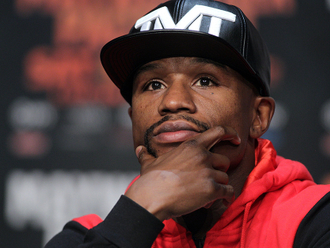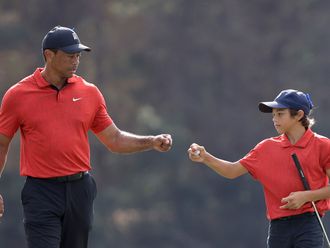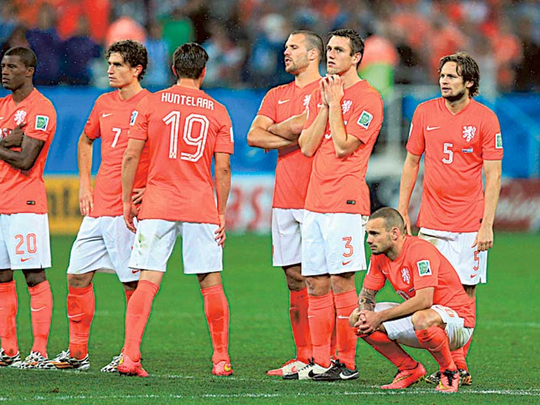
Amsterdam: German fans often sing “Ohne Holland fahr’n wir zur EM” — we’re going to the Euros without Holland — and their song is coming true: the Netherlands, a superpower of European and global football, failed to qualify for France 2016 and appear disoriented with an apparently dark future.
As recently as 2014, the Oranje were one penalty kick away from a World Cup final which would have been their second in succession — and that after dealing defending champions Spain a 5-1 thrashing in the group stages.
Only two years later, Dutch stars like Arjen Robben, Robin van Persie and Wesley Sneijder will have to watch the Euros on television, while countries like Iceland, Albania and Northern Ireland get to compete for the title. The football world cannot help but wonder: how could that happen?
In the Netherlands, many had long predicted the collapse of the national team. The Euro qualifying round “definitively took off the Dutch team’s mask,” the Dutch daily De Volkskrant wrote.
“A bitter parody of total football, a pitiful sports team with nothing to do in the finals [of a major tournament],” the newspaper described the once-mighty Dutch team.
This collapse started in the country’s top clubs, like Ajax and PSV Eindhoven. The distance that separates them from Europe’s major sides has grown conspicuously large, for reasons that are not all related to the big financial differences between them and football giants in Spain or England.
The Dutch remain true to their old playing style, based on dominant play, even though it has not brought them success. Meanwhile, their much-hyped youth ranks are failing to deliver top talent. The national team’s performances had hidden these problems until now. However, the players of the Netherlands’ last golden generation, the likes of Van Persie, Sneijder, Robben and Rafael van der Vaart, are approaching the end of their careers. Their successors appear to lack what it takes to step up to the plate with the national team.
Dutch captain Robben feels responsible and wants to contribute to the reconstruction of a successful team.
“My goal is the 2018 World Cup. That is why I continue,” he recently said.
And yet the issue of how long he can actually keep going is wide open, since the Bayern Munich striker’s injuries are as famous as his fantastic dribbling.
It is equally unlikely that other stars like Sneijder and Van Persie can stay much longer, and Schalke forward Klaas-Jan Huntelaar recently evaded the question.
“Well, I don’t know whether this is the end of a generation,” he admitted after the Euro qualifying fiasco.
In Brazil 2014, the Netherlands’ manager at the time, Louis van Gaal, already had to tackle the team’s lack of quality. He could only be successful because he relinquished the side’s trademark, almost sacred, attacking style.
And yet even Van Gaal’s defensive alternative only worked for a while. His successors, first Guus Hiddink and, after his early dismissal, Danny Blind, brought back the Netherlands’ classic tactics, but the consequences were disastrous: the Dutch are set to miss the Euros for the first time since 1984.
Experts call for a completely new beginning. For many, that should include changes in the squad, on the bench and at the national federation. The federation, however, will have none of that, and the hapless Blind is set to stay on for the World Cup qualifying round.
“We need to build,” said federation secretary-general Bert van Oostveen.
“We need to look ahead,” Blind noted.
The new beginning has so far failed to emerge, and the national team’s future still looks black. The Dutch face several major problems, according to De Volkskrant.
“Football, coaching, resistance, rival forces, technique, creativity, everything really,” the daily listed the issues.
All that can hardly be solved by the start of qualifying for Russia 2018, and it remains most uncertain whether the Netherlands can earn a World Cup berth in a group that holds among others France and Sweden.
“Get ready for the possibility that the Netherlands only return to a major tournament in 2020,” the Dutch daily Algemeen Dagblad warned.


